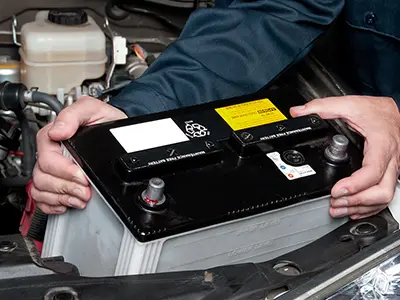
Automotive industry experts have shared tips on how to avoid rapid drainage of your car battery during harsh winter conditions. One of the common concerns that car owners face is the unexpected drain on their batteries during the cold months. However, if you follow a few simple recommendations, you can significantly reduce the likelihood of this problem occurring.
If the air temperature drops below 10 degrees Celsius in the garage or outside, experts recommend removing the battery from the car and storing it in a warm room. If the temperature does not drop to 10 degrees, it is enough to disconnect one of the terminals from the on-board electrical network. These measures will help prevent your battery from draining quickly on cold days.
One of the important points that helps prevent sudden battery discharge is to regularly check the electrolyte level. Particular attention should be paid to insufficient electrolyte levels as this may result in overcharging the battery if a faulty charger or alternator is used. Such circumstances may damage the battery. In addition, you should monitor insufficient electrolyte levels, as this can also negatively affect battery performance in winter.
Remember that in the cold season there is no need to drain the electrolyte from the battery. According to experts, it is important to closely monitor electrolyte levels and conduct regular checks to ensure battery reliability.
Auto-redemption may be one of the rational options for solving the problem of battery discharge during the cold season. If you're experiencing frequent battery drain or your vehicle is in need of major repairs that could cause additional wear and tear on the battery, auto repurchase companies like ours at Shelby provide the ability to buy vehicles in any condition, including those with battery issues. . This will allow you to avoid problems with discharge and save on costs associated with car repairs
Also, one of the significant factors in preventing battery drain during the colder months is choosing the right battery type. There are several types of batteries, and the right choice can greatly improve the reliability of your automotive electrical power system.
- Battery series. It is important to consider the battery series. For example, batteries with the "S" series (Starting) are designed to start the engine, while batteries with the "D" series (Deep Cycle) are more suitable for deep discharge applications such as solar panels. In the cold season, it is recommended to choose batteries with the “S” characteristic, as they provide a high starting current.
- Battery type. Consider different types of batteries, such as lead-acid (most common), gel, AGM (absorbed glass fiber), and lithium-ion. Each has its own advantages and disadvantages, as well as different characteristics regarding cold resistance. For example, AGM and gel batteries generally perform better at low temperatures compared to conventional lead-acid batteries.
- Battery capacity. Choose a battery with adequate capacity to suit your vehicle's needs. Large capacity can provide additional energy to operate the system at low temperatures.
- Brand and quality. Buy batteries from trusted manufacturers such as Exide, Bosch, Varta and others to ensure long life and reliable performance.
- Service. Regular battery maintenance, including checking electrolyte levels (if applicable), can extend battery life and reduce the risk of discharge.
Choosing the right battery can have a significant impact on the reliability of your vehicle's electrical system during cold weather.
Remember:

